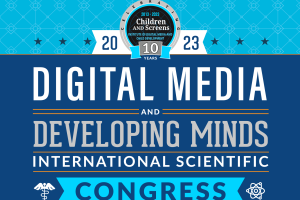Children and Screens’ events bring together researchers, clinicians, educators, government agency representatives, and others with expertise in psychology, psychiatry, neuroscience, pediatrics, communications, social work, public health, education, and more to explore how digital media use impacts the social, psychological, cognitive, behavioral, and physical development of children.
The Institute holds these events to foster collaboration, inspire new ideas for future research, and to collect and distribute timely, accurate information and helpful resources for the general public.
Explore Events
#AskTheExperts
#AskTheExperts webinars bring together interdisciplinary panels of experts across the fields of education, public health, child development, psychology, psychiatry, advocacy and more to address pressing issues on digital media’s impacts on child development. The goal of this signature series is to share insights from scientific research and clinical practice, foster collaborative conversation, exchange ideas, and provide free resources to promote children’s health for parents, caregivers, educators, and others.
Congresses
The Digital Media and Developing Minds Scientific Congress is a recurring multi-day convening that brings together experts from multiple disciplines to address critical questions related to digital media’s effects on child development. Congresses feature panel discussions, research symposia, flash talks, poster sessions, and other opportunities for dialogue, networking and collaboration for professionals dedicated to promoting a digital landscape that supports the health and wellbeing of children.
Research Retreats
Research retreats address a specific theme tied to digital media’s influence in the lives of youth. These retreats convene interdisciplinary, international groups of researchers, educators, school administrators, clinicians, and nonprofit and government agency representatives to engage in collaborative discussions on these issues and establish future research and education agendas for the field.



